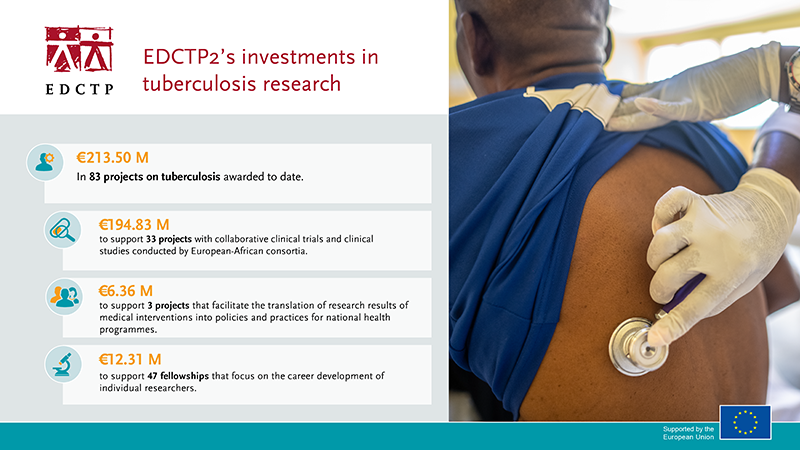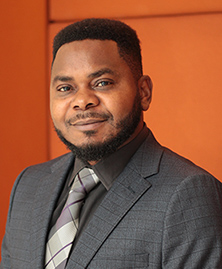World TB Day 2024: Funding innovative research to end TB
On this World TB Day 2024, EDCTP reinforces its commitment to investing in tuberculosis (TB) research and development, an important part of the jigsaw to end TB. However, ending TB depends on concerted global efforts and continued investments to accelerate the development of innovative new tools.
The theme of this and last year’s World TB Day – YES! WE CAN END TB – resonates well with EDCTP’s strategy over the last 20 years and the significant investments made in all types of innovative medical interventions to end TB.

Between 2014 and 2024, EDCTP has invested € 213.50 million in collaborative clinical studies on TB, capacity building and talent development through its second programme (EDCTP2), featuring as the second largest public funder of TB research and the third largest funder of TB research overall in the 2021 Report on TB Research Funding Trends, a publication of the Treatment Action Group.
Building on the work of previous EDCTP programmes, Global Health EDCTP3 continues to fund collaborative research and innovation projects tackling infectious diseases as well as supporting activities for research and capacity building in Africa. It does so by funding competitive calls for proposals, including a currently open call to support innovative digital health solutions that can accelerate the development of preventive, therapeutic or diagnostic interventions addressing poverty-related diseases in sub-Saharan Africa, such as tuberculosis. Since its launch in 2021, Global Health EDCTP3 has invested €19.45 million to support TB-related collaborative research.
The EDCTP portfolio on TB includes projects that aim to improve methods of TB detection and monitoring of response to therapy, and to shorten the duration of treatment. Several major vaccine development projects are also being supported.
A strong focus is on diagnosis. Tuberculosis is difficult to diagnose on the basis of clinical symptoms, culture methods take weeks to deliver results, and molecular diagnostics are expensive and often require special facilities. As a result, there is an urgent need for novel tools and testing practices to detect TB cases efficiently and more rapidly so that treatment can be started promptly – benefiting patients and reducing the risk of further disease transmission.
More efficient detection of TB
The EDCTP2-funded DIAMA project, which brings together groups in nine sub-Saharan African countries, is focusing on the diagnosis and management of patients with multidrug-resistant TB (MDR-TB). Three DIAMA sites generated field data on Cepheid’s Xpert MTB/XDR cartridge, which can rapidly detect resistance to second-line drugs such as isoniazid and fluoroquinolones used in the WHO-recommended regimen for rifampicin-resistant TB. This information was considered in the latest revision of WHO guidance on TB detection. The consortium have also shared data with WHO that contributed to the 2023 rapid communication on use of targeted next-generation sequencing for diagnosis of drug-resistant tuberculosis. The Rapid Communication was released in advance of updated WHO consolidated guidelines (soon expected) for diagnosis of TB to inform national TB programmes and other stakeholders of key changes expected in the available options for detection of TB drug resistance and to allow for rapid transition and planning at the country level.
Cough classification to detect TB
The EDCTP2-funded Cough Audio triaGE for TB (CAGE-TB) project is developing an innovative, inexpensive cough audio classifier to identify missing (undiagnosed) TB cases. Using a smartphone with the cough classifier app, healthworkers can test people entering the health clinic by analysing the sound of their cough. On the basis of the cough analysis, only suspected TB cases would proceed to molecular diagnosis. This innovative, simple and cheap technology, which requires no sample collection and testing, could help in the rapid identification of missing TB cases at health facilities in high-burden areas.
Global Health EDCTP3 is now providing further funding to support the continuation, and successful delivery of this project, under the new name of 4-CAGE-TB, after the original project’s disruption due to COVID-19. The 4-CAGE-TB project will now be able to complete wider testing of the cough analyser in Uganda and South Africa. Consultations with patients, health workers and national TB programmes will also be conducted to understand how best to ensure acceptability, uptake and implementation, and raise awareness of the product in local communities.
The project is led by Professor Grant Theron (Stellenbosch University, South Africa), a former EDCTP Senior Fellow and an emerging authority on TB diagnostics. He was part of the team that demonstrated the practicability of the Xpert molecular diagnostic platform, informing WHO recommendations on its use. He also played a key role in highly influential EDCTP2-funded studies revealing that, in practice, Xpert had less impact than expected because clinicians’ treatment choices were only partly based on diagnostic results – emphasising the importance of understanding the context in which diagnostic tests are used.
Using treatment decision algorithms to improve TB diagnosis in children
Diagnosis of TB in childhood remains a challenge. In 2022, WHO conditionally recommended the use of treatment decision algorithms (TDAs) to improve the diagnosis of pulmonary TB in children and called for the external validation of two suggested TDAs for children. The Decide TB project, funded by Global Health EDCTP3, will generate evidence for the implementation of a comprehensive TDA-based approach to tuberculosis treatment in children, including malnourished children and children living with HIV, in high-burden, resource-limited countries. The project started on 1 April 2023 and will be implemented in Mozambique and Zambia.
The Decide TB project builds up on the EDCTP2-funded RaPaed TB project, which brought together a multi-disciplinary consortium of experts to evaluate promising new diagnostic approaches for childhood TB. These include TAM-TB, a blood test that showed promise in the EDCTP1-funded TB-CHILD project, a Xpert MTB/RIF molecular diagnostic adapted for stool samples, and a prototype test, Cepheid Mycobacterium tuberculosis Host Response prototype cartridge (MTB-HR) which measures a three-gene transcriptomic signature from fingerstick blood. Data on the performance of tests are contributing to the establishment and refinement of WHO guidelines on TB diagnostics for children and have been shared to inform the ongoing WHO-review for the Guideline Development Group (May 2024). The Cepheid MTB-HR test is undergoing further development, based on the promising results reported in the RaPaed TB project.
Building scientific leadership to end TB
A core element of all EDCTP programmes is capacity building to strengthen the science base in sub-Saharan Africa. This has included a substantial investment in human capacity through our extensive fellowship programme. Many EDCTP Fellows have gone on to assume leadership positions in African science and continue to generate high-quality research outputs on poverty-related infectious diseases, including on TB research.
Fellow profile: Professor Novel Chegou

Through his EDCTP Senior Fellowship, Prof. Novel Chegou aims to develop a much-needed new diagnostic that would accelerate the detection of TB meningitis in children, enabling treatment to begin much sooner. Prof. Chegou has gained extensive experience in previous EDCTP-funded TB biomarker projects. We asked Prof. Chegou how his EDCTP Fellowship has helped him to establish himself as a research leader through additional technical training, mentoring and leadership skills development.
